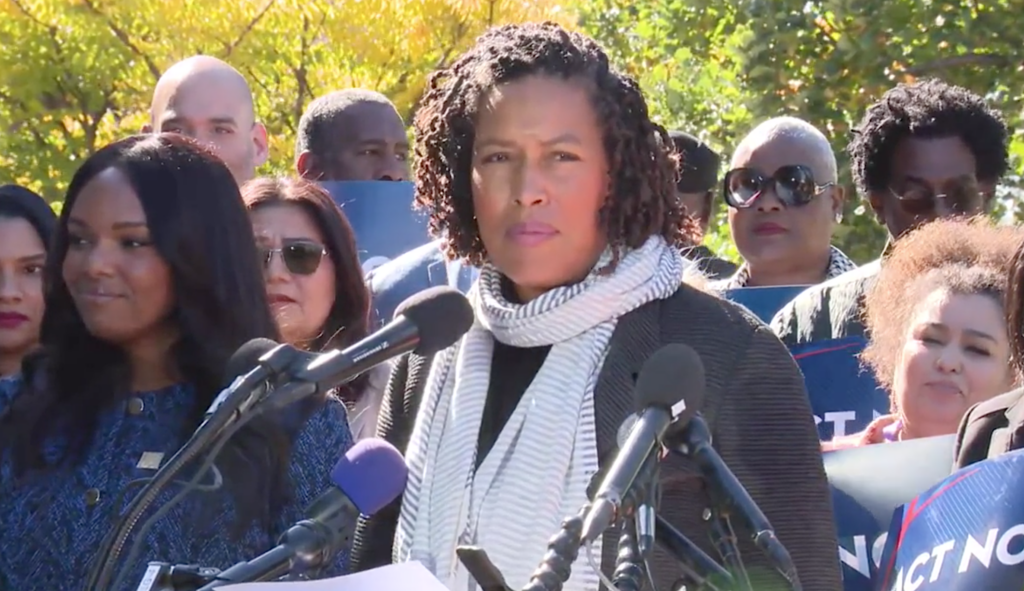Mayor’s Crime Bill, ACT Now, Seeks to Curb Violence, Retail Theft, Drug-dealing
By • October 23, 2023 0 770

The unrelenting increase in crime in Washington, D.C. — particularly homicides, gun violence, carjacking and mass retail robberies — has all the usually contentious District Council and Office of the Mayor clearly agreeing on one thing: It is unacceptable. Scenes of dozens of seemingly young people, wearing ski masks and sweeping shelves clean of products that they openly shove into bags with impunity has gotten attention, near and far, to the embarrassment of the city.
Still, Mayor Muriel Bowser and the 13-member Council less clearly agree on how to stop, control and prevent such crimes — now.
Last fall, a new crime bill that actually loosened most of the terms of liability and police officers’ legal ability to give chase and arrest the perpetrators — many of them known recidivists — was challenged by Congress.
Since the District of Columbia is not a state but a federal district, Congress has the power to oversee any laws passed by the District Council and signed by the mayor (or not) in a legal process called a “resolution of disapproval.” That so-called “soft-on-crime” bill was disapproved by Congress and the Senate and signed by President Biden. So, the mayor went back to the drawing board.
This morning, Oct. 23, she introduced her new proposal. “It will make crime perpetrators more accountable and law enforcement officials more transparent and able to take appropriate enforcement and restraining actions when appropriate,” Bowser announced at a press conference in front of the Metropolitan Police Department’s 4th District station on Georgia Avenue. It adds a new category of crime, “mass retail robbery,” and strengths a former regulation that had been dropped regarding the declaration of no-gathering free drug zones. The bill also reinstates a pre-pandemic law that made it illegal to wear a mask for the purpose of hiding one’s identity to commit a crime — particularly a full face-covering ski mask in summer.
Bowser also introduced acting MPD Chief Pamela Smith to explain the suggested policing laws. “Let’s get her approved!” added the mayor in her introduction, as an aside to Council members who must approve the selection.
The Addressing Crime Trends Now Act (ACT Now) that the mayor intends to introduce at the Council’s November meeting, “helps create an environment that better supports communities and victims as well as the Metropolitan Police Department’s (MPD) ability to hire and retain highly qualified officers,” she said.
“These proposed laws are mostly just common sense,” the mayor said firmly. Bowser’s proposals are a response to the Council’s safety reforms in the light of the murder of George Floyd by police in 2020. Both the mayor and the chief perceive the latest ideas as adjusting the unintended consequences of those Council changes.
The first three pillars include new policing requirements that would assure that law enforcement officers can review their body-worn camera footage before writing their initial police report in certain circumstances (to ascertain the color of a car, for instance) and defining what information will be posted publicly related to officer discipline.
“The new law also makes permanent clarification of what constitutes legitimate vehicular pursuit by the police with a focus on public safety,” Smith said. “It also includes: clarifying the distinction between a serious use of force and incidental contact with the neck (there are on-scene videos to demonstrate the differences, according to Smith).”
The next three pillars involve: “Combating Organized Retail Theft,” “Addressing Loitering Around Open-Air Drug Markets” and “Making it Unlawful to Use Masks for Committing Criminal Acts.”
According to Bowser, the proposed law establishes a new crime for “directing organized retail theft” which makes it illegal for any person to act as the organizer of a theft for profit scheme by recruiting or directing individuals to commit organized retail theft.
The new law would also limit loitering around a known area of drug retail activity by reinstating the ability of the MPD Chief to declare “temporary drug-free zones.” These zones can interrupt the buying, selling and using of drugs — and allow neighborhoods to clean up and reclaim public space.
The sixth pillar would reinstate a pre-pandemic law that makes it unlawful to wear a mask for the purpose of committing criminal acts, intimidating and threatening other people, or causing fear.
“These new laws are not about making crimes or even creating felonies out of former misdemeanors,” Bowser said in response to a press question. “It is not about criminalizing behavior but rather changing behavior.”
As if to indicate that progress is being made in the fight against crime, Chief Smith added that MPD has 23 new officers this month.

